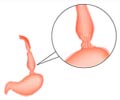A new test for esophageal reflux disease developed by a Wake Forest University Health Sciences (WFUHS) otolaryngologist has been licensed to Bayer HealthCare’s Diagnostics…
A new test for esophageal reflux disease developed by a Wake Forest University Health Sciences (WFUHS) otolaryngologist has been licensed to Bayer HealthCare’s Diagnostics Division by WFUHS.
The test, which detects the presence of human pepsin 3b in a patient’s saliva, was developed by Jamie Koufman, M.D., then professor of otolaryngology at Wake Forest University School of Medicine and director of WFUHS’s Center for Voice Disorders. She is now director of the Voice Institute of New York.The test potentially could be used in the offices of primary care physicians and avoid the need for more elaborate and expensive tests. Bayer will market the test.
“Most people associate heartburn with excess stomach acid, but it is the digestive enzyme pepsin (and not acid) bathing the lower area of the esophagus that causes the damage,” said Koufman. “For patients with severe esophagitis, the tissue in the esophagus is literally being self-digested.”
“Besides helping to diagnose gastroesophageal reflux disease, or ‘GERD,’ detecting pepsin in saliva also should help diagnose laryngopharyngeal reflux disease, the backflow of stomach contents into the throat,” she said. “Laryngopharyngeal reflux disease is even more difficult to diagnose than GERD. Scientific evidence points to aerosolized pepsin being drawn into the respiratory system as a common culprit of chronic cough, asthma, and even sinusitis.”
Dean Stell, associate director of the Office of Technology Asset Management, said, “Bayer is a world leader in point-of-care diagnostics and is well qualified to handle the next stage of development. That is the essence of technology transfer – working with our industrial counterparts who can develop technology in ways that we cannot.”
Stell added that the licensing step was “a milestone following 25 years of research, and lots of hard work by Dr. Koufman and the people on her team.”
Advertisement
Koufman said laryngopharyngeal reflux remains under-diagnosed and under-treated. “It is a frequent cause of hoarseness, a sensation of a lump in the throat, difficulty swallowing, choking episodes, and respiratory symptoms. It is sometimes difficult to diagnose because it is often silent, occurring without symptoms or heartburn.”
Advertisement






